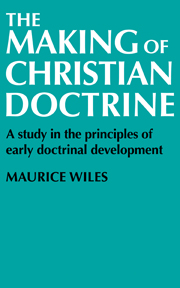Book contents
- Frontmatter
- Contents
- List of Abbreviations
- 1 The Development of Doctrine: The Nature of the Problem
- 2 Motives for Development in the Patristic Age
- 3 Scripture as a Source of Doctrine
- 4 Lex Orandi
- 5 Soteriology
- 6 The Form of the Arguments
- 7 The Assimilation of New Ideas
- 8 Towards a Doctrine of Development
- Index
- Frontmatter
- Contents
- List of Abbreviations
- 1 The Development of Doctrine: The Nature of the Problem
- 2 Motives for Development in the Patristic Age
- 3 Scripture as a Source of Doctrine
- 4 Lex Orandi
- 5 Soteriology
- 6 The Form of the Arguments
- 7 The Assimilation of New Ideas
- 8 Towards a Doctrine of Development
- Index
Summary
It is not always easy to remember that theo-logians say their prayers and take their part in the worship of the Church. We are most likely to overlook this basic fact when we read some of the more harshly polemical writings of the early Fathers. Yet many of them were bishops, not merely participants but leaders in the liturgical life of the Church. And the fiercer the controversy in which they were involved, the more important it is to recall the influence of the Church's worship upon their doctrinal beliefs. For it is often there that the key to understanding the fervour and the bitterness of the controversy lies. Men do not normally feel so deeply over matters of formal doctrinal statement unless those matters are felt to bear upon the practice of their piety. The close interrelation of doctrine and worship is an important element in explaining the desperate seriousness with which issues of doctrine were regarded in the early centuries.
The importance of the early Church's worship as a clue to the understanding of many features of the New Testament has been much stressed in recent years. The main emphasis in such studies has lain upon liturgical practice as helping to explain the way in which different New Testament writings have come to take their present form. But the practice of worship is almost equally important for any study of doctrinal development within the New Testament period.
- Type
- Chapter
- Information
- The Making of Christian DoctrineA Study in the Principles of Early Doctrinal Development, pp. 62 - 93Publisher: Cambridge University PressPrint publication year: 1967
- 1
- Cited by

